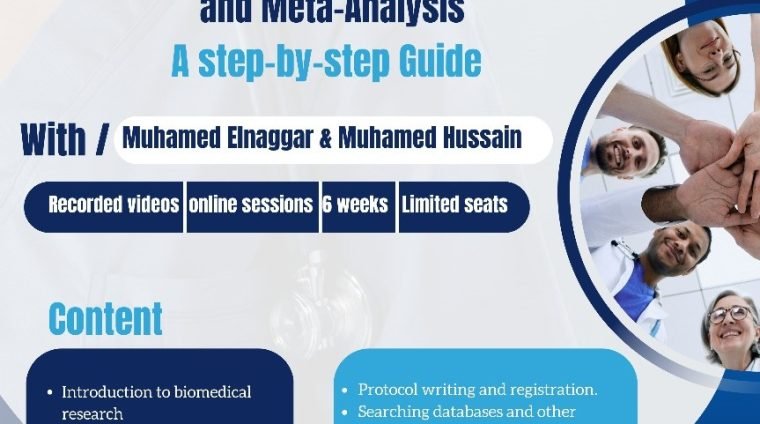Mastering Systematic Reviews and Meta-Analysis A Step-by-Step Guide
Systematic Review and Meta-Analysis Course
Are you ready to dive into the world of evidence-based research?
This course offers a comprehensive, step-by-step guide to conducting systematic reviews and meta-analyses — essential tools for synthesizing scientific evidence in healthcare and beyond.
Designed with practical examples and real-world application, the course empowers you to lead high-quality reviews with confidence.
Course Duration
Total Modules: 9 sessions
Estimated Total Time: 14–15 hours
Includes: short assessments, Feedback form
Target Audience:
This course is ideal for:
Healthcare professionals involved in clinical or academic research
Postgraduate students (Master’s or PhD level)
Medical educators and public health researchers
Anyone interested in evidence synthesis and publication
Learning Objectives :
Knowledge Objectives:
Define systematic reviews and meta-analyses, explain their importance in evidence-based practice, and describe their common applications in health research.
List and describe the key steps of conducting a systematic review, including protocol development, search strategy, study selection, appraisal, data extraction, meta-analysis, and interpretation.
Differentiate between types of systematic reviews and types of meta-analysis models .
Skill Objectives:
Formulate a structured research question using PICO and develop a review protocol with guided practice.
Execute a comprehensive search strategy using major databases (e.g., PubMed, Scopus).
Appraise articles using standardized critical appraisal tools.
Extract and organize data from included studies into a standardized extraction form.
Perform a basic meta-analysis using RevMan or R, and generate forest and funnel plots.
Interpret meta-analytic results and summarize findings in a structured written format.
Present a group-based summary of the review process and findings
Attitude Objectives:
Acknowledge the role of systematic reviews and meta-analyses in improving healthcare decisions
Demonstrate critical thinking and question the quality of published evidence.
Commit to conducting unbiased and transparent research reviews following established guidelines (e.g., PRISMA).
Collaborate effectively within a team to complete review tasks.
Show willingness for continued learning and self-development in evidence synthesis.
Materials Provided
All course materials are available on the course platform and include:
Video lectures explaining key concepts
Downloadable PDF files with course notes and supporting documents
Access to quizzes and feedback forms
Navigation Guide
The course is structured over 9 lessons, each focusing on a key component of systematic reviews and meta-analysis. Learning materials are organized by lessons, and are accessible via the master academy platform (medicalmasteryuk.com)
Lesson 1 Introduction to Systematic Reviews
Part 1 :
Welcome & Introduction
Overview of the course
Objectives and expectations
Part 2 :
Introduction to PubMed
PubMed Tutorial
Exploring Different Types of Studies
Accessing Research Papers
Part 3:
Downloading Research Papers
Open-Access
EKB , Sci-Hub
Lesson 2 Conducting Literature Reviews: Practical Guide
Part 1:
Types of Literature Reviews
Differentiate Research Topic
Exploring Different Papers
Part 2 :
How to write Reviews
Literature Reviews steps
How to Determine Research Fields
How to Read Reviews
Part 3:
Validate Your Research Idea
Search for Suitable Journals
How to Contact the Journal
How to Collect a Research Team
Lesson 3 : Literature Review Structure
Part 1 :
Quick review of key concepts from previous lessons
Literature Reviews outline
Part2 :
How to Prepare Your First Draft
How to Use Mendeley (Reference Manager)
Lesson 4 : Literature Review Focus and Criteria
Part 1:
PICO Framework
Part2:
Eligibility Standards
Part 3:
Basic Search Strategy
Lesson 5 Literature Search & Screening
Part1
Developing an Advanced Search Strategy
Part 2
Study Screening and Selection Process
Part3
Study Registration and Protocol Submission
Lesson 6 Data Handling & Quality Assessment
Part1 :
Principles of Data Extraction
Part2:
Practical Steps for Data Extraction
Types of Bias and Assessing Study Quality
Part3 :
Cochrane Library Review, Registration, and Training
Lesson7:Introduction to Biostatistics
Part1:
Data type
Descriptive statistics
Measures of Central Tendency
Measures of Dispersion
Data Distribution
Part2 :
Fundamentals of Meta-Analysis
Lesson 8: Meta-analysis Practical Guide
Part 1
Core Elements in reviews (Interventions, diagnostic, outcome)
Cochrane Web (Systematic Review Platform)
Test Tools & Metrics (Odds Ratio, Risk Ratio,Hazard Ratio)
Lesson 9: Meta-Analysis & Diagnostic Accuracy Studies
Meta-Analysis Programs
Diagnostic Test Accuracy
ROC Curve (Receiver Operating Characteristic)
Risk of Bias Assessment
Assessment & Feedback
Knowledge test
Feedback form
- 14 Sections
- 23 Lessons
- 15 Hours
- Lesson 1 (Introduction to Systematic Reviews)3
- Lesson 2 (Conducting Literature Reviews: Practical Guide)3
- Assessment (1 & 2 )1
- Lesson 3 (Literature Review Structure)2
- Lesson 4 (Literature Review Focus and Criteria)3
- Assessment (3 & 4 )1
- Lesson 5 (Literature Search & Screening)4
- Lesson 6 (Data Handling & Quality Assessment)3
- Assessment (5 & 6 )1
- Lesson 7 (Introduction to Biostatistics)2
- Lesson 8 (Meta-analysis Practical Guide)1
- Lesson 9 (Meta-Analysis & Diagnostic Accuracy Studies)1
- Assessment (7-8-9 )1
- Feedback1
Muhammed H. Elnaggar
- Founder and CEO of Tetraploid Team.
- Advisor at GuidePoint, NY, USA.
- Advisor at Mendeley.
- Research Assistant at Faculty of Pharmacy and Biotechnology, the German University in Cairo (GUC).


